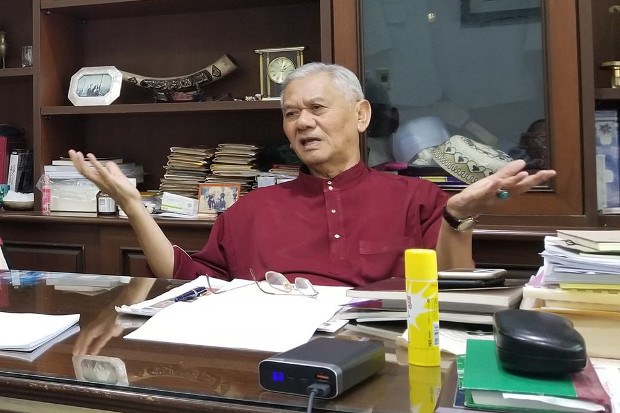MPs from Thai Deep South Want Role in Peace Talks
2019.06.27
Pattani and Narathiwat, Thailand
 Areepen Utarasint, who served nine terms as a member of the Thai parliament representing the Deep South, discusses ways to improve the regional peace process during an interview at his office in Narathiwat province, June 1, 2019.
Areepen Utarasint, who served nine terms as a member of the Thai parliament representing the Deep South, discusses ways to improve the regional peace process during an interview at his office in Narathiwat province, June 1, 2019.
Updated at 9:04 a.m. ET on 2019-06-28
A trio of lawmakers in Thailand’s Deep South say members of parliament should participate in peace talks between the government and armed separatist groups because they represent people who would be most impacted by ending the region’s 15-year-old insurgency.
Areepen Utarasint, who just retired after nine terms as an MP representing Narathiwat, one of the provinces in the Deep South, said people there wanted to feel like they were represented in Bangkok. He noted that about three-quarters of eligible voters in the southern border region had cast ballots in parliamentary elections on March 24.
“There should be politicians, especially MPs as ‘observers’ during peace talks. There are 11 MPs from the Prachachart, Democrat, Bhumjaithai and Palang Pracharat parties [who represent the Deep South]. They need to be involved in the negotiations because they know more about the local people’s problems,” Areepen told BenarNews.
He was referring to four-year-old Malaysia-brokered peace talks between the government and MARA Patani, an umbrella organization representing rebel groups in negotiations with the government. So far, these have produced no tangible results.
Three of the parties – Bhumjaithai, Democrat and Palang Pracharat – support Prime Minister Prayuth Chan-o-cha, while Prachachart is part of an opposition coalition. Prayuth took over the reins of government after leading a military coup against then-Prime Minister Yingluck Shinawatra in 2014. Earlier this month, the former Thai army chief was elected to a second term as prime minister by a vote among MPs and senators.
Sukarno Matha, a current Deep South MP from the opposition Prachachart Party, supports Areepen’s call for MPs to have a voice in the peace process.
“In the past, the committee led by the southern army commander, did not open a room for local politicians,” Sukarno told BenarNews. “There should be MPs included in committees which could have roles in the peace talks.”
“With their insights about the region, they could bring in dimensions that the military could not see,” Sukarno said.
Areepen’s suggestion also drew support from lawyer-turned-MP Adilan Alee-ishoh, who is a member of the pro-Prayuth coalition.
“The government must not fuel the fire by allowing violence to be carried out by insurgents, allowing them to expand their alliances,” Adilan told Benar. “Nowadays, there is something that pushes locals to become sympathizers or insurgents. Exercising unfair law enforcement will push people to join the other side.”
Support for Areepen’s statement, however, was not unanimous.
The man who submitted his resignation letter last month as the chief negotiator for MARA Patani raised doubts about adding MPs to the mix.
“I don’t really agree with that … it would allow the MPs to build up ‘political mileage,’” Sukree Hari told BenarNews.
Sukree is one of three National Revolutionary Front (BRN) members involved with MARA Patani. The largest and most powerful of the southern insurgent groups, BRN’s hardcore leaders have avoided the peace talks.
MP advising regional army chief
Before his election, Adilan sat on a local committee supporting peace-talk efforts.
He now serves as an adviser to a local committee led by the regional army commander. He said he appreciated a statement by the commander, Lt. Gen. Pornsak Poolsawat, who said he would like to discuss human rights issues with local MPs.
Still, Adilan said, the military has not created a mechanism for people to follow the talks. In his view, local residents and MPs should be members of committees involved in the process.
The talks between MARA Patani and Prayuth’s military government began in 2015, but have led to no breakthroughs. They stalled in February, when MARA Patani leaders announced they were suspending participation until after the March general election.
In 2015, the junta established three committees to oversee the peace talks. The steering committee is led by the prime minister and is responsible for mapping out the government’s policy on the Deep South.
The peace dialogue panel, which saw the promotion of retired Gen. Udomchai Thammasarorat in late 2018 to chief negotiator, is responsible for negotiating with representatives of the insurgents.
The inter-agency coordination working group led by Pornsak includes locals and at least one MP. It is responsible for creating good will in the region to aid peace talk efforts.
The Malay-speaking and predominately Muslim Deep South borders Malaysia and encompasses Pattani, Narathiwat and Yala provinces as well as four districts in Songkhla province. Nearly 7,000 people have been killed in violence in the region since the insurgency flared up in early 2004 after a dormant period.
CORRECTION: An earlier version listed the Democrat Party as part of the opposition.







